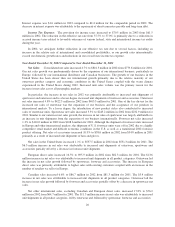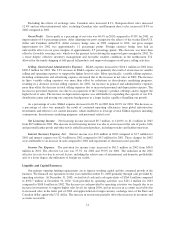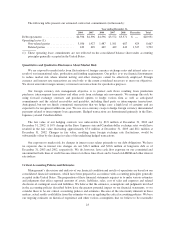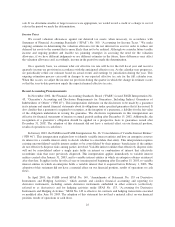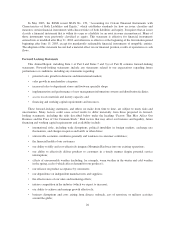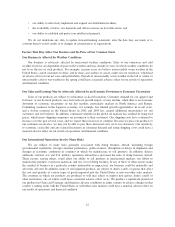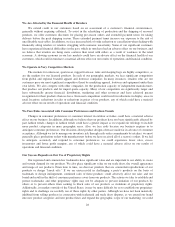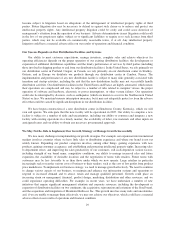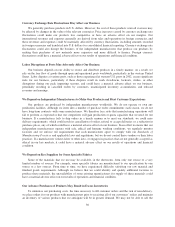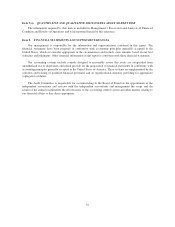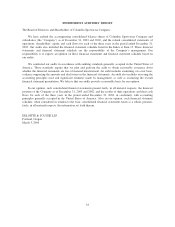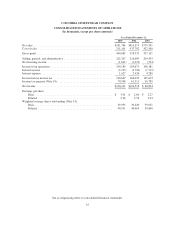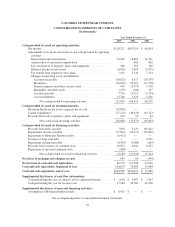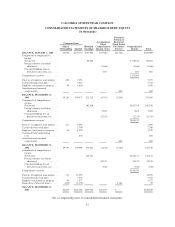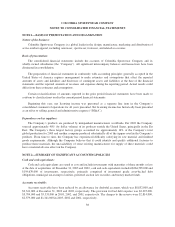Columbia Sportswear 2003 Annual Report Download - page 35
Download and view the complete annual report
Please find page 35 of the 2003 Columbia Sportswear annual report below. You can navigate through the pages in the report by either clicking on the pages listed below, or by using the keyword search tool below to find specific information within the annual report.Currency Exchange Rate Fluctuations May Affect our Business
We generally purchase products in U.S. dollars. However, the cost of these products sourced overseas may
be affected by changes in the value of the relevant currencies. Price increases caused by currency exchange rate
fluctuations could make our products less competitive or have an adverse effect on our margins. Our
international revenues and expenses generally are derived from sales and operations in foreign currencies, and
these revenues and expenses could be materially affected by currency fluctuations, including amounts recorded
in foreign currencies and translated into U.S. dollars for consolidated financial reporting. Currency exchange rate
fluctuations could also disrupt the business of the independent manufacturers that produce our products by
making their purchases of raw materials more expensive and more difficult to finance. Foreign currency
fluctuations could have a material adverse effect on our results of operations and financial condition.
Labor Disruptions at Ports May Adversely Affect Our Business
Our business depends on our ability to source and distribute products in a timely manner. As a result, we
rely on the free flow of goods through open and operational ports worldwide, particularly in the western United
States. Labor disputes at various ports, such as those experienced at western U.S. ports in 2002, create significant
risks for our business, particularly if these disputes result in work slowdowns, lockouts, strikes, or other
disruptions during our peak importing seasons, and could have a material adverse effect on our business,
potentially resulting in cancelled orders by customers, unanticipated inventory accumulation, and reduced
revenues and earnings.
We Depend on Independent Manufacturers to Make Our Products and Meet Customer Expectations
Our products are produced by independent manufacturers worldwide. We do not operate or own any
production facilities. Although we enter into a number of purchase order commitments each season, we do not
have long-term contracts with some manufacturers. We therefore face risks that manufacturing operations will
fail to perform as expected or that our competitors will gain production or quota capacities that we need for our
business. If a manufacturer fails to ship orders in a timely manner or to meet our standards, we could miss
delivery requirements, which could result in cancellation of orders, refusal to accept deliveries or a reduction in
purchase prices, any of which could have a material adverse effect on our business. In an effort to ensure that our
independent manufacturers operate with safe, ethical and humane working conditions, we regularly monitor
factories and we enforce our requirements that each manufacturer agree to comply with our Standards of
Manufacturing Practices and applicable laws and regulations, but we do not control these vendors or their labor
practices. If a manufacturer violates labor or other laws, or engages in practices that are not generally accepted as
ethical in our key markets, it could have a material adverse effect on our results of operations and financial
condition.
We Depend on Key Suppliers for Some Specialty Fabrics
Some of the materials that we use may be available, in the short-term, from only one source or a very
limited number of sources. For example, some specialty fabrics are manufactured to our specification by one
source or a few sources. From time to time, we have experienced difficulty satisfying our raw material and
finished goods requirements. Although we believe that we could identify and qualify additional factories to
produce these materials, the unavailability of some existing manufacturers for supply of these materials could
have a material adverse effect on our results of operations and financial condition.
Our Advance Purchases of Products May Result in Excess Inventories
To minimize our purchasing costs, the time necessary to fill customer orders and the risk of non-delivery,
we place orders for our products with manufacturers prior to receiving all of our customers’ orders and maintain
an inventory of various products that we anticipate will be in greater demand. We may not be able to sell the
30


